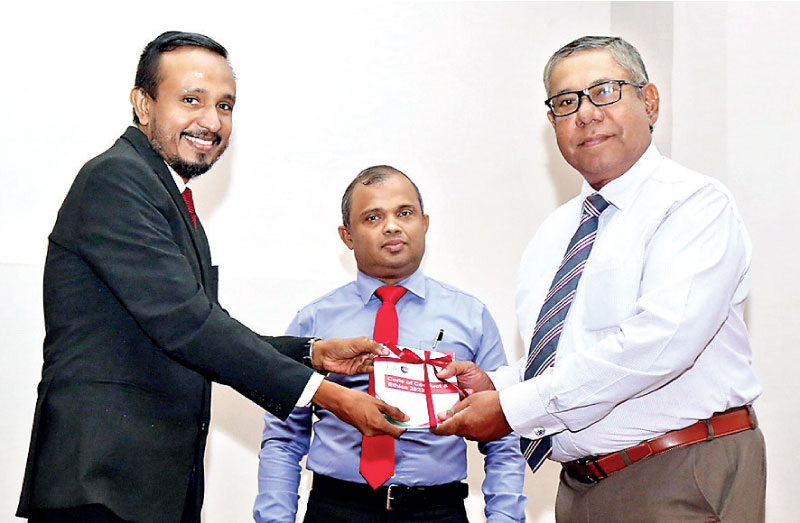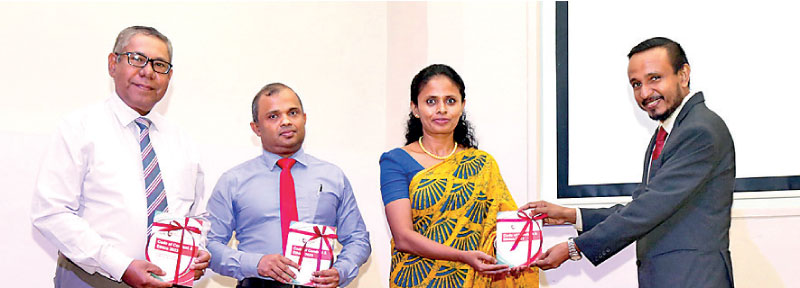Sunday Feb 22, 2026
Sunday Feb 22, 2026
Monday, 26 June 2023 03:13 - - {{hitsCtrl.values.hits}}

Education and Curriculum Development Committee Chairman Prof. Roshan Ajward presenting the first copy of the code to Reyaz Mihular in the presence of CA Sri Lanka President Sanjaya Bandara

Copies of the code being presented to the special invitees
|
Reyaz Mihular addressing the event
|
The Institute of Chartered Accountants of Sri Lanka (CA Sri Lanka) recently introduced a new code of conduct and ethics for mid-level professional accountants in yet another ground-breaking initiative to promote the highest standards of integrity and ethics within the accounting profession.
The code which is applicable to both Certified Business Accountants (CBA) and Certified Corporate Accountants (CCA), intends to improve the standing and credibility of mid-level accountants produced by CA Sri Lanka. The code provides CBAs and CCAs with a set of guidelines and examples outlining how to conduct themselves in the business and professional spheres while abiding by core principles in bolstering the integrity and ethics of the profession.
The code was launched in the presence of a distinguished gathering including Reyaz Mihular, a distinguished corporate leader and past president of CA Sri Lanka, as well as CA Sri Lanka President Sanjaya Bandara, Education and Curriculum Development Committee Chairman Prof. Roshan Ajward, and CA Sri Lanka Acting CEO Prasanna Liyanage.
In his speech, Mihular defined integrity as “Always doing the right thing when no one is looking at you.” Elaborating his point further, he explained that while every man is good from the moment they are born, integrity is breached when one surrenders one’s self-respect for self-interest.
”Therefore, we have to be mindful of the temptation of doing tiny surrenders of self-respect for self-interest,” he said. Mihular added that the Code of Ethics imposes an obligation on all professional accountants to be straightforward and honest in all their professional and business relationships. “This is called fair dealing and truthfulness,” he said.
Sanjaya Bandara emphasised that although accountants are known for serving as gatekeepers of organisations, they also play a particularly essential role in maintaining public trust. “This vital role sets an Accountant apart from many other professionals,” he said.
Bandara further explained that the Code of Conduct and Ethics has always played a crucial role in the life of a Professional Accountant. “The value of ethics has increased over time amid unprecedented challenges, and the introduction of the Code of Conduct and Ethics for CBAs and CCAs is part of our ongoing efforts to ensure that Professional Accountants produced by CA Sri Lanka are compliant with international requirements and best practices.”
CBA and CCA are two new mid-level qualifications introduced by CA Sri Lanka in 2020. Both CBAs and CCAs have carved an important niche in both the public and private sectors in Sri Lanka.
Prof. Roshan Ajward explained that as the premier national accounting body, CA Sri Lanka has taken maximum efforts to ensure that its members abide by the highest professional ethical principles. “Taking a step forward, CA Sri Lanka has furnished this Code of Conduct and Ethics 2023 for its Certified Business Accountants and Certified Corporate Accountants who are engaged in business and employed in practicing organisations. This code provides guidelines on complying with the fundamental ethical principles using a conceptual framework approach,” he said.
Prof. Ajward added that the introduction of the new code is an extremely positive and progressive step in further strengthening the accounting profession.
The code has been structured into three parts. Part one contains the conceptual framework approach, which includes the fundamental ethical principles, threats and safeguards that is applicable to all CBAs and CCAs, while part two sets out additional materials that apply to CBAs and CCAs in business when performing professional activities. The third part focuses on additional material that applies to CBAs and CCAs employed in practising organisations, when providing professional services.